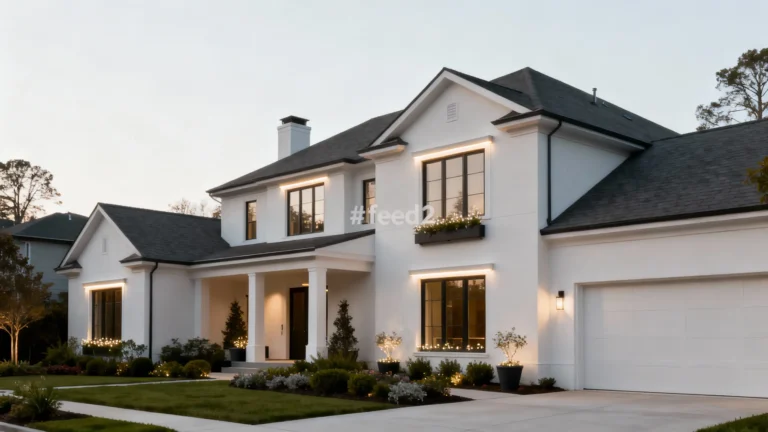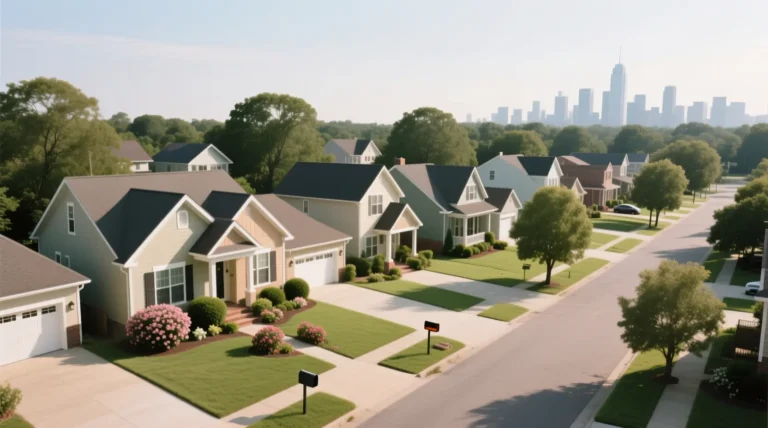
Anúncios
Looking for the perfect home in a vibrant and growing city can be overwhelming, but Atlanta, Georgia, offers a wealth of options that suit every budget and lifestyle. From charming neighborhoods to bustling urban centers, there’s something for every homebuyer ready to make their move today. Discover how to navigate the market and find affordable houses for sale in Atlanta that feel like home from the start.
Understanding Atlanta’s Housing Market and Affordable Neighborhoods
Atlanta’s housing market has experienced steady growth, driven by a booming economy and increasing job opportunities. However, rising demand has pushed prices upward, making affordability a key concern for many buyers. Despite this, there are still pockets of the city where buyers can find houses for sale in Atlanta, Georgia, that offer great value without breaking the bank.
Several neighborhoods stand out for their affordability. Areas like West End, East Point, and College Park offer a mix of charming older homes and newer developments at prices below the city’s median. These communities are benefiting from ongoing revitalization efforts, improving amenities while maintaining lower home prices. Buyers should also explore neighborhoods such as Smyrna and Marietta just outside the city limits, where housing options tend to be more budget-friendly without sacrificing access to Atlanta’s conveniences.
Atlanta’s rapid population growth and strong job market, particularly in tech, film, and logistics, fuel demand for housing. This demand pushes prices up but also encourages new construction and neighborhood improvements, which can increase long-term value. Understanding these trends helps buyers target areas poised for growth but still affordable.
Anúncios
First-time homebuyers should focus on neighborhoods that balance price with quality of life—safe streets, good schools, and access to transit or shopping. Visiting multiple areas, researching local developments, and working with knowledgeable real estate agents can make a big difference. Being flexible on home size or style can open more options in affordable zones. Taking time to assess community features alongside price ensures smart, satisfying purchases amid Atlanta’s dynamic housing market.
Steps to Preparing Financially Before Buying a House in Atlanta
Before diving into the search for houses for sale in Atlanta Georgia, getting your finances in order is crucial. Start by creating a detailed budget that accounts for your monthly income, expenses, and potential new costs, such as mortgage payments, property taxes, and maintenance. This will give you a clear picture of what price range is realistic for your purchase.
Next, check your credit score because lenders rely heavily on it to determine loan eligibility and interest rates. If your score is low, take steps to improve it before applying for a mortgage—pay down debts, avoid opening new credit accounts, and correct any errors on your credit report. Even a small increase can significantly lower your loan costs.
Saving for a down payment is often the biggest hurdle. In Georgia, many buyers can take advantage of loan programs like the Georgia Dream Homeownership Program, which offers down payment assistance to eligible buyers. Additionally, Federal Housing Administration (FHA) loans are popular here for requiring lower down payments and more flexible credit requirements.
Getting pre-approved for a mortgage is a smart move. It not only clarifies your buying power but also shows sellers that you are serious and financially prepared. Using your pre-approval limit, calculate a comfortable price range that won’t strain your finances.
Planning ahead creates confidence, helping you move quickly when an affordable home in Atlanta comes onto the market. Preparing your finances carefully will make the process smoother and put you in a strong position to secure the right property.
How to Effectively Search and Identify Suitable Houses for Sale in Atlanta
Searching for houses for sale in Atlanta, Georgia, can feel overwhelming, but breaking down the process makes it manageable. Start by exploring online real estate platforms like Zillow, Realtor.com, and local Atlanta-specific sites. These tools allow you to filter listings by price, size, neighborhood, and amenities. Use keywords like “affordable,” “recently reduced,” or specific community names to narrow results and focus on properties that fit your budget and needs.
Partnering with a trusted real estate agent who knows the Atlanta market is invaluable. Agents provide access to off-market listings and guide you in identifying homes that might not be easily found online. Local networks, including community groups on social media or neighborhood associations, can also uncover hidden gems or upcoming listings before they appear on major websites.
Attending open houses offers firsthand insight but can consume a lot of time. Balance this by scheduling virtual tours, which have become more common and allow you to view multiple properties quickly without leaving home. When reviewing homes virtually, pay close attention to details like layout, natural light, and signs of maintenance issues, asking agents specific questions about any concerns.
Stay organized throughout your search by keeping a list or spreadsheet of homes you’re interested in. Note key features, asking prices, and your impressions. Set alerts on listing sites to receive updates on new or reduced-price homes. Being proactive and responsive will increase your chances of securing an affordable house that meets your goals in Atlanta’s competitive market.
What to Look for During Home Inspections and Evaluations in Atlanta
When evaluating houses for sale in Atlanta, Georgia, a thorough home inspection is essential to avoid costly surprises. One of the most critical areas to examine is the foundation. Atlanta’s clay soil can cause foundation shifting or cracks, especially in older neighborhoods like Grant Park or East Atlanta. Look for any signs of uneven floors, cracks in walls, or doors that don’t close properly, which may indicate foundation problems.
The roof is another key factor. Due to Atlanta’s humid climate and occasional severe weather, roofs can suffer from leaks or damage over time. Check for missing shingles, water stains on ceilings, or signs of mold around attic spaces. Neighborhoods with older homes, such as Decatur or Candler Park, often have aging roofs that might need repair or replacement.
Plumbing issues are common in many parts of Atlanta, particularly in homes built before the 1980s. Old pipes can lead to leaks, low water pressure, or water discoloration. Pay close attention to faucets, water heaters, and visible piping in basements or crawl spaces. Mold and mildew in bathrooms or kitchens are red flags that warrant further evaluation.
Professional inspections are invaluable because they provide detailed reports from licensed experts. Buyers should explicitly ask inspectors to evaluate electrical systems, HVAC units, drainage, and pest infestations—especially termites, which are prevalent in Georgia’s climate.
If the inspection reveals major problems, use the findings to negotiate repairs or price reductions with the seller. Being informed empowers you to request credits or have repairs completed before closing. This approach can secure you a better deal on affordable houses in Atlanta, protecting your investment in the long run.
Navigating the Buying Process and Closing in Atlanta, Georgia
Once you’ve found the perfect affordable house among the many houses for sale in Atlanta Georgia, the next step is making an offer. Your real estate agent will help you craft a competitive offer based on local market conditions and recent sales in the neighborhood. Offers usually include the price, contingencies like financing and inspection, and your proposed closing date. In Georgia, contracts are legally binding, so it’s important to review all terms carefully before signing.
Negotiations often follow your initial offer. Sellers might counter with different terms on price or repair requests. Your agent acts as the liaison to ensure communication stays clear and professional. Keep in mind that Georgia law requires offers and counteroffers be in writing to avoid misunderstandings.
Once both parties agree, a purchase agreement is signed. At this point, your lender begins processing your mortgage application, including appraisal and underwriting. It’s wise to have an attorney review your contract for any state-specific details or concerns. In Georgia, while an attorney isn’t required to close, having one can help clarify complex contract language.
Closing costs in Atlanta typically range from 2% to 5% of the home’s price. These can include loan origination fees, title insurance, and property taxes. Buyers should prepare for a closing timeline of about 30 to 45 days, depending on financing and inspections. Your agent and lender will guide you on documents to bring, such as ID and proof of insurance, to ensure a smooth signing day.
Understanding these steps and collaborating closely with your agent, attorney, and lender will help turn the dream of owning an affordable Atlanta home into reality.
Tips for Settling Into Your New Atlanta Home and Neighborhood
After purchasing one of the many affordable houses for sale in Atlanta Georgia, the next step is to make your new house truly feel like home. Begin by setting up your utilities early. Contact local providers such as Georgia Power for electricity, Atlanta Water for water services, and Comcast or AT&T for internet and cable. Scheduling these services before moving in ensures you won’t face unnecessary delays or discomfort.
Exploring nearby essential services will ease your transition. Locate the closest grocery stores, pharmacies, and medical clinics. Apps like Nextdoor and Google Maps can help you discover trusted businesses and read community reviews. It’s also wise to register your new address for postal services and update your information with banks and any subscriptions you hold.
Integrating into your new Atlanta neighborhood can be both rewarding and fun. Attend community events, visit local farmers’ markets, and join neighborhood groups online or in person. Volunteer opportunities in parks or schools can also help you form meaningful connections while giving back. Atlanta offers a rich cultural scene—visit museums like the High Museum of Art or explore diverse dining options to experience the city’s vibrant lifestyle.
For affordable home customization and maintenance, check out stores like The Home Depot and Lowe’s for sales and budget-friendly materials. Local workshops and community colleges often offer DIY classes tailored to homeowners. Don’t overlook neighborhood groups on social media where residents share recommendations for trusted contractors and helpful tips for property upkeep.
Finally, take full advantage of Atlanta’s outdoor spaces. Spend time in beautiful parks like Piedmont Park or explore trails along the Chattahoochee River. Local schools and community centers often host events that can enrich your family’s daily life. Embracing these amenities will help you settle in quickly and enjoy the unique charm of your new Atlanta home.
Finding Your Affordable Dream Home in Atlanta
Atlanta’s housing market presents abundant opportunities for those seeking affordable houses for sale without sacrificing quality or community. By understanding the market, preparing financially, and navigating the buying process confidently, you can step into your dream home with enthusiasm and ease.
Remember, thorough home inspections and choosing the right neighborhood are key to making a smart investment. Once settled, embracing your new community will unlock the full experience of what living in Atlanta has to offer.
We’d love to hear about your homebuying journey in Atlanta! Share your experiences or questions in the comments and help others find their perfect home today.









